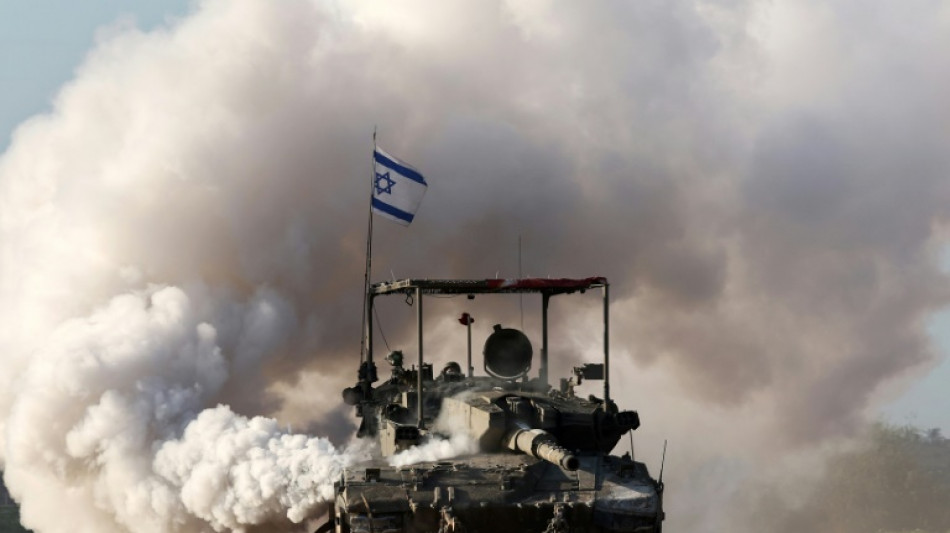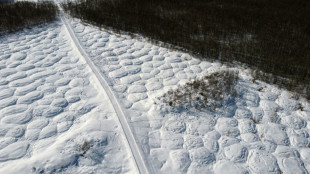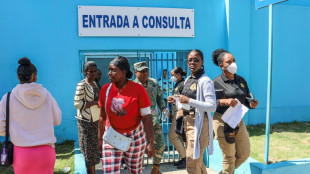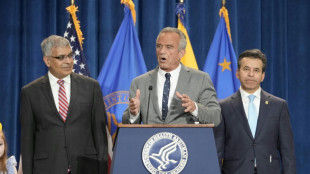

Deadly fighting grinds on in Gaza's Khan Yunis
Israel stepped up its assault in the Gazan city of Khan Yunis on Thursday, with the Palestinian Islamist movement Hamas saying dozens were killed in heavy bombardment and urban combat.
The Israeli army says it has "encircled" Khan Yunis, the hometown of Hamas's Gaza chief Yahya Sinwar, accused of being the mastermind of the October 7 attacks that sparked the war.
Hamas, which has ruled Gaza since 2007, reported fierce clashes in the centre and west of the city, where fighting has been inching closer to hospitals sheltering thousands of displaced people.
Its health ministry said at least 50 people were killed in Khan Yunis over the past 24 hours. The army said several militants were killed in "close-quarters combat" in the city, and that strikes also targeted militants in central and northern Gaza.
At Deir al-Balah in central Gaza, the scene of some of the heaviest fighting, AFPTV footage showed graves with the names of those buried scrawled on them in crayon amid debris-strewn streets and pockmarked buildings.
"Those look like graves, but they are not proper ones," said Ahmad Abdul Salam, a resident of the city's Al-Maghazi refugee camp. "We buried whole families, who were wiped out, inside these mass graves."
The war erupted when Hamas and other militants from Gaza launched the unprecedented October 7 attacks on Israel which claimed about 1,140 lives, according to an AFP tally of official Israeli figures.
Militants also seized 250 hostages, and Israel says around 132 remain in Gaza. That number includes the bodies of at least 28 dead hostages, according to an AFP tally based on Israeli figures.
Israel in response vowed to crush Hamas and launched a relentless military offensive that the Palestinian territory's health ministry says has killed at least 25,700 people, about 70 percent of them women and children.
- Attack on UN shelter -
On Wednesday, the United Nations said tank shells struck a building sheltering 800 people in Khan Yunis, killing nine and wounding 75.
UNRWA chief Philippe Lazzarini condemned the shelling.
"Once again a blatant disregard of basic rules of war," Lazzarini said on the social media platform X, adding the compound had been clearly marked as a UN facility and its coordinates had been shared with Israeli authorities.
James McGoldrick, interim UN humanitarian coordinator for the Palestinian territories, said "buildings were ablaze" in the aftermath of the strike.
"Many people are trying to flee the scene but unable to do so," he said.
Asked about the shelling, the Israeli army said "a thorough review of the operations of the forces in the vicinity is underway", adding it was examining the possibility that the strike was a "result of Hamas fire".
The Israeli army is the only force known to have tanks operating in the Gaza Strip.
The United States also condemned the bombardment, with State Department spokesman Vedant Patel saying "civilians must be protected and the protected nature of UN facilities must be respected".
- Israeli protests -
The government of Israeli Prime Minister Benjamin Netanyahu has faced mounting calls for a ceasefire, with domestic pressure intensifying after 24 soldiers were killed Monday in the army's deadliest single day since it launched its Gaza ground operations.
In Tel Aviv, Israeli protesters carried a banner saying: "Stop the bloodshed," and blocked a road during a demonstration to demand a deal for the release of the hostages held by Hamas.
"We came to say to the government: 'It's enough.' We want all the hostages back home, we want a ceasefire now," said protester Sapir Sluzker Amran.
"There is no military solution, only a diplomatic solution -- only agreements will bring the hostages back."
Netanyahu, however, has been adamant the war will continue, telling parliament on Wednesday that the fighting would persist until the "aggression and evil" of Hamas were destroyed.
"This is a war for our home," he said.
US President Joe Biden's Middle East envoy Brett McGurk was in the region for talks aimed at brokering a new deal to free the remaining captives in exchange for a pause in fighting.
A Palestinian source familiar with the talks said a Hamas delegation had travelled to Cairo this week to meet Egypt's intelligence chief and discuss new ceasefire proposals.
- Israel-Qatar row -
Egypt and Qatar have acted as mediators in the conflict, including in November, when a brief truce agreement led to the release of 105 hostages.
But Netanyahu was allegedly caught on tape telling hostages' families this week that Qatar's mediation was "problematic", blaming it for funding Hamas.
The Gulf state said it was "appalled" at the remarks, which "if validated, are irresponsible and destructive to the efforts to save innocent lives".
Israel's far-right Finance Minister Bezalel Smotrich hit back on Thursday, accusing Qatar of being responsible for the October 7 Hamas attack.
Qatar is the "patron of Hamas and is largely responsible for the massacre committed by Hamas of Israeli citizens", Smotrich said on X. "Qatar is a country that supports terrorism and finances terrorism."
Yemen's Iran-backed Huthi movement fired three missiles at two merchant ships in the Red Sea in their latest attack in the commercially vital waterway, with the White House saying one missile missed its target and a US Navy destroyer shot down the other two.
The Huthis vowed to continue targeting ships despite repeated US and British strikes against them.
burs-dv/kir
T.A.Smith--RTC



